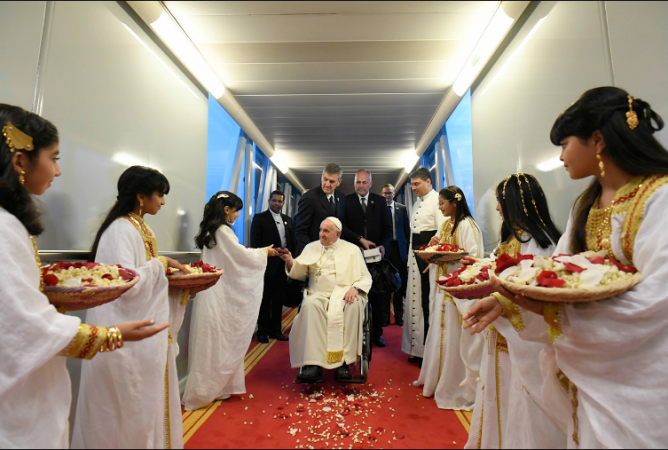
Manama: In the state of Bahrain, where the Sunni-led government is hosting an interreligious conference on East-West coexistence despite allegations of discrimination against the Shia majority, Pope Francis on Thursday delivered his message of dialogue with the Muslim world.
Human rights organizations and relatives of Shia activists have urged Francis to use his visit to call for an end to political repression and the death penalty in Bahrain.
Francis' four-day visit, the first by a pontiff to an island nation in the Persian Gulf, made it unclear whether he would explicitly and publicly offend his hosts.
When he traveled to Bahrain, the 85-year-old Pope, who has spent several months in a wheelchair because of knee ligaments, announced he was in "a lot of pain" and for the first time greeted journalists who walked down the aisle. Instead they were traveling with him while sitting in the plane.
Francis has long emphasized dialogue as a means to bring about peace and felt that the demonstration of interreligious harmony, like Russia's conflict in Ukraine and other local conflicts in Yemen, is essential.
Francis requested prayer on the eve of the visit in order to "advance the cause of brotherhood and peace, which is so urgently and urgently needed in our time."
This is Francis' second visit to the Gulf Arab nation, following his historic visit to Abu Dhabi in 2019, where he signed a document promoting Catholic-Muslim fraternity with a prominent Sunni cleric, Sheikh Ahmed Al-Tayeb.
The main imam of al-Azhar, the center of Sunni education in Cairo, is al-Tayyib. Francis then traveled to Iraq in 2021, where he was received by one of the world's leading Shia clerics, Grand Ayatollah Ali al-Sistani.
Also Read: UN Security Council urged to avoid agreements that support the Iranian regime's survival
Al-Tayeb and other prominent figures from the interfaith community are expected to attend the conference, which Francis will meet again this week in Bahrain. The conference is similar to the one organized by Kazakhstan last month in which Francis and al-Tayyib also participated.
According to the Bahrain program, the spiritual head of the world's Orthodox Christians, Patriarch Bartholomew, a member of the regional Muslim Council of Elders, a representative of the Russian Orthodox Church, and a United States rabbi are all expected.
Francis will also be able to serve Bahrain's 80,000 or more Catholics, who make up about 1.5 million of Bahrain's population.
Although travel organizers anticipate that pilgrims from Saudi Arabia and other nearby countries will attend Francis' mass mass at the national stadium on Saturday, most are activists from the Philippines and India.
Sacred Heart Parish, the first Catholic church to open its doors to the bay in 1939, and Our Lady of Arabia Cathedral, the largest, are both located in Bahrain.
The 2,300-person church, which sits on land donated by King Hamad bin Isa Al Khalifa, began last year in the desert town of Awali.
In fact, the king extended the first invitation to visit the Vatican in 2014 and gave Francis a model of the church.
Also Read: Pope’s Visit to Bahrain: Calls to Address Human Rights Issues are Growing
Francis will visit both churches while in the country and is expected to thank the king for the country's long-standing tolerance for its Christian population, especially in contrast to Saudi Arabia, which is beside and allows Christians in the public. does not allow him to practice his faith.
Bishop Paul Hinder, Apostolic Administrator of Bahrain and other Gulf Arab countries, claimed that religious freedom in Bahrain "may be the best in the Arab world."
Even if the conditions are not perfect, there may be conversions (to Christianity) that are not at least as formally accepted as they are in other countries.
Shia opposition groups and human rights organizations have urged Francis to highlight the abuse of the Shia majority by the Sunni monarchy during his visit to Bahrain.
They demanded that his death sentence be abolished and visit the Jaw prison, which houses hundreds of Shia activists.
The use of forced confessions, "sham tests," and torture against dissidents has been strongly condemned by Human Rights Watch and Amnesty International.